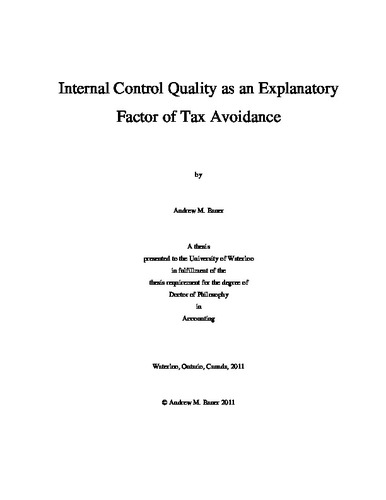| dc.description.abstract | Internal control disclosures mandated by section 404 of the Sarbanes-Oxley Act (SOX) are designed to provide information about a firm’s financial reporting quality and in doing so may offer information on firm-specific tax planning activities. Internal control weaknesses disclosed under SOX are frequently related to a firm’s tax function (Ge and McVay, 2005; Gleason, Pincus and Rego, 2010) and thus raise the question of whether or not these frequent problems affect corporate tax avoidance.
In this thesis, I test hypotheses that tax-related disclosures, particularly those that contain company-level internal control weaknesses (ICWs), provide information with respect to long-run tax avoidance. Furthermore, I test hypotheses that the combination of internal control quality and aggressive tax avoidance aid in assessing shareholder returns. To conduct these tests, I collect and construct firm-level SOX disclosure data from 2004 to 2006 across 1,286 publicly-owned corporations. I begin with an empirical analysis of the association between tax avoidance and firm-level ICWs and generally find that the presence of tax ICWs and company-level tax ICWs constrain long-run tax avoidance. For firms with low cash constraints however, company-level tax ICWs appear to lead to an increase in tax avoidance. Nevertheless, subsequent analysis of monthly abnormal returns implies that the stock market reacts negatively to the disclosure of company-level tax ICWs, regardless of whether or not tax aggressiveness is also present.
This thesis contributes to the literature by documenting the first evidence that internal control disclosures provide information regarding firm-level tax planning. Although the number of internal control weakness disclosures is decreasing over time, the availability of these SOX disclosures represents a previously unavailable opportunity to examine and further understand internal governance mechanisms within the firm and their influence on tax planning. In addition, this thesis further corroborates prior literature that argues for the importance of the pervasiveness of internal control weaknesses by showing that the pervasive, company-level tax internal control weaknesses are associated with tax avoidance and lower shareholder returns.
Finally, my dissertation implies that the presence of tax internal control weaknesses constrains tax avoidance and thus a focus on improving internal controls could help improve the tax planning function. However, my firm-level analysis also implies that effective tax planning is a sustainable process and thus a firm and its stakeholders may require several periods before the full benefits of these improvements are realized. | en |

